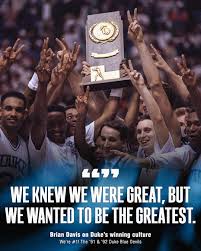The Forgotten Star: Brian Davis and the Shadow Beneath the 1991 Duke Championship
In the storybook season of 1990-91, when the Duke Blue Devils finally broke through to win their first NCAA Championship, the spotlight blazed down on Christian Laettner, Bobby Hurley, and a rising freshman star named Grant Hill. Coach Mike Krzyzewski’s team had reached the mountaintop after years of heartbreak, and the media celebrated the program’s coronation like a coronation of kings. But behind the flashbulbs and headlines stood a player whose fingerprints were all over Duke’s triumph—Brian Davis, a name now rarely mentioned when that legendary season is recalled.

Brian Davis was no benchwarmer. The 6-foot-4 junior forward was a vital part of the rotation, a defensive stalwart, and one of the fastest players on the floor. He started every game of the NCAA Tournament that year and played major minutes in the most pivotal contests. He guarded opponents’ top scorers, took charges, made hustle plays, and kept Duke balanced on both ends of the floor. And yet, history has largely forgotten his name.
While Laettner hit the big shots and Hurley commanded the offense, Davis did the dirty work. In the championship game against Kansas, Davis scored 10 points on 5-of-7 shooting and snagged 3 rebounds. He ran the floor tirelessly, matched up with bigger opponents, and made sure Duke never let up. But when the team cut down the nets, the cameras zoomed in elsewhere.
Davis wasn’t just fighting for playing time. He was fighting to be seen.
In an era when media narratives often clung to racial and class-based archetypes, Davis—a Black student-athlete with a sharp basketball IQ and ambitions beyond the court—found himself boxed in. He was perceived as a role player, even when his performance said otherwise. He later admitted in interviews that he felt invisible at times during Duke’s rise. “I gave them everything,” he told a friend in 1992. “But I knew I’d never be the face of Duke.”
There was a complexity to Davis’s presence at Duke. As one of the few Black players on a predominantly white campus and team, he shouldered unspoken expectations. He excelled in the classroom and maintained strong relationships with teammates, but outside the team, the admiration he saw given to others didn’t always extend to him. And when Laettner’s popularity soared into pop culture—even earning him a spot on the 1992 Dream Team—Davis remained in the background.

Yet his influence off the court might be even more profound than what he did between the lines.
After graduating from Duke, Davis continued his journey with Laettner as a business partner. They co-founded Blue Devil Ventures and sought to channel their fame into real estate investments and development projects. The duo made headlines not for basketball, but for bold entrepreneurial ambition. Unfortunately, their partnership became entangled in legal disputes and financial losses. Once again, the scrutiny landed harder on Davis than on his more famous counterpart.
Some speculated that the public, still unsure how to frame Davis’s story, found it easier to paint him as the failed sidekick rather than the savvy businessman who took risks.
But Brian Davis has never asked for pity. He’s only asked to be remembered accurately.
“The way history writes you is not always the way you lived it,” Davis once said in a rare interview. “But I know what I gave to Duke. I know what I gave to my teammates. That’s enough for me.”
Today, younger generations of Duke fans may not even recognize his name. But for those who watched Duke’s 1991 run closely, Davis was more than a role player—he was an anchor. He was the embodiment of the sacrifice and commitment that championship teams are built upon.
There’s something quietly heroic about his journey. Davis didn’t need the spotlight to shine. He just needed the game—and the brotherhood that came with it. Still, it’s time we shine that light back on him, if only to remind the basketball world that no championship is ever won alone.
Let this be more than a footnote. Let it be a tribute.
To Brian Davis, the forgotten star of 1991—your legacy is long overdue.





























